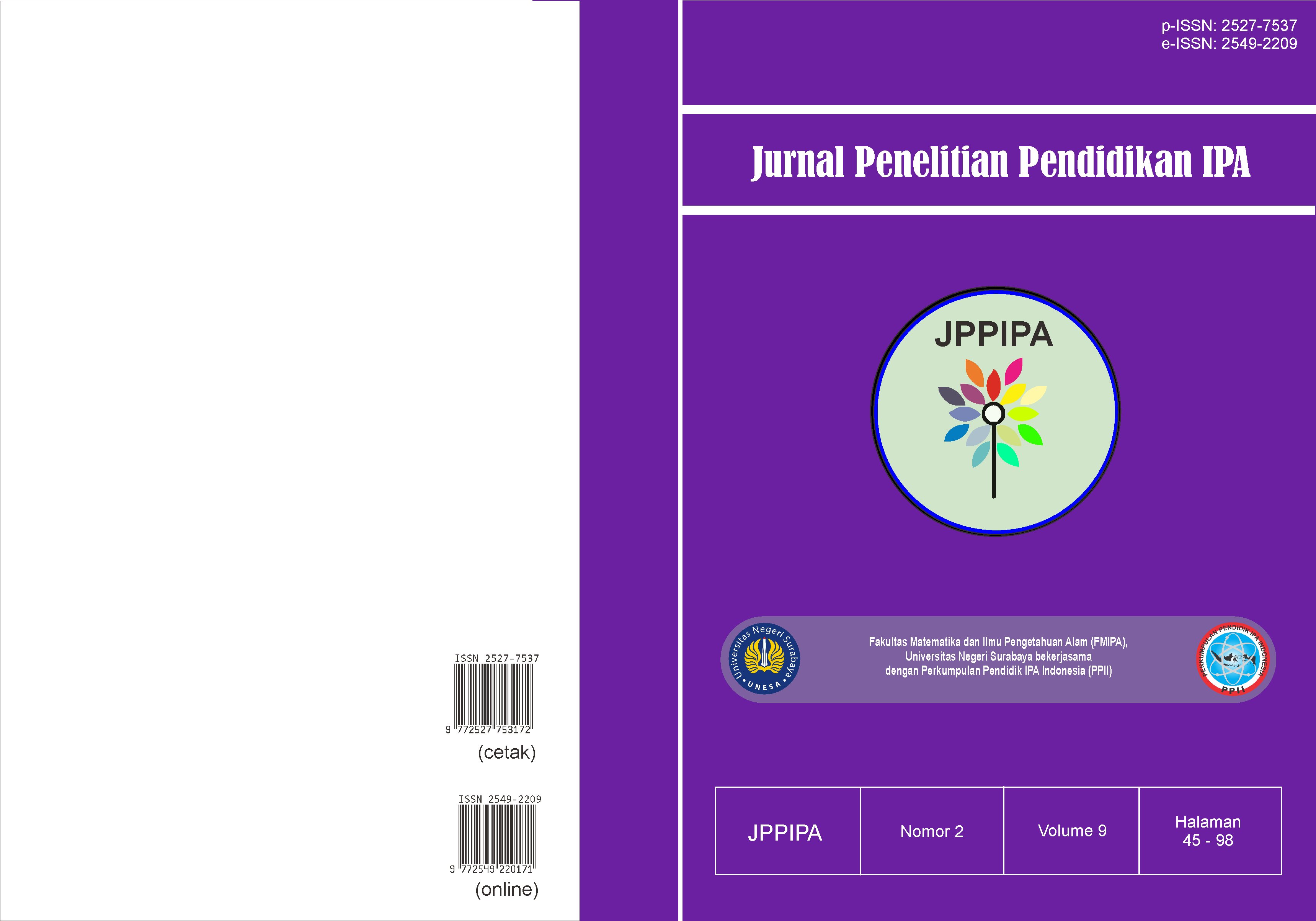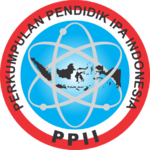THE APPLICATION OF A MULTIMEDIA-ASSISTED PROBLEM-BASED LEARNING MODEL BASED ON ANDROID TO ENHANCE STUDENTS' CRITICAL THINKING SKILLS
DOI:
https://doi.org/10.26740/jppipa.v9n2.p88-98Keywords:
PBL, AABTLT, Android, Critical ThinkingAbstract
The study’s goals are to find out how the students in class IX-A at MTsN 11 Tasikmalaya’s critical thinking skills and activities improved after using the problem-based learning (PBL) model with the help of multimedia apps on their Android phones and to see how they felt about the model. We conducted this classroom action research in three cycles, utilizing the Kurt Lewin design, which included stages of planning, implementation, observation, and reflection. Multiple-choice tests with reasons were used to measure critical thinking skills, while student activity sheets and questionnaires were used to assess student activity and responses. The results showed an increase in student activity, from 60.2% (poor) in cycle I to 78.5% (good) in cycle II and 80.6% (good) in cycle III. An increase in critical thinking skills also occurred, with an N-Gain value of 0.43 (low) in cycle I, increasing to 0.68 (moderate) in cycle II and 0.69 (moderate) in cycle III. There was no significant difference between male and female students. In general, the students’ response to the Android-based multimedia-assisted PBL model was positive, with a score of 80.1%.
References
Adinda, A., Mulia, S., Irfan, I., & ... (2024). Penerapan Strategi Pembelajaran Scaffolding Dalam Membentuk Kemandirian Peserta Didik. Jurnal Bima: Pusat Publikasi Ilmu Pendidikan bahasa dan Sastra, 2(2). https://doi.org/10.61132/bima.v2i2.763
Agusmin, R., Nirwana, N., & Rohadi, N. (2018). Peningkatan Motivasi dan Hasil Belajar Siswa dengan Model Problem Based Learning Berbantuan Simulasi PhET di Kelas XI IPA-C SMAN 6 Kota Bengkulu. Jurnal Kumparan Fisika, 1(2), 53–59. https://doi.org/10.33369/jkf.1.2.53-59
Amalia, R., & Radiansyah, R. (2023). Implementasi Model PBL Pendekatan TPACK Media Interaktif Untuk Meningkatkan Aktivitas dan Berpikir Kritis Siswa SD. Jurnal Pendidikan Tambusai, 7, 23233–23242. https://jptam.org/index.php/jptam/article/view/10286%0Ahttps://jptam.org/index.php/jptam/article/download/10286/8261
Amiruddin, A., Rochman, C., & Nana, N. (2024). Mengukur Efektivitas Model Pembelajaran Berbasis Masalah (PBL) dalam Pembelajaran IPA. Jurnal Pendidikan Mipa, 14(3), 723–731. https://doi.org/https://doi.org/10.37630/jpm.v14i3.1790
Anwar, A. (2022). Media sosial sebagai inovasi pada model PjBL dalam implementasi Kurikulum Merdeka. Inovasi Kurikulum, 19(2), 239–250. https://doi.org/10.17509/jik.v19i2.44230
Diana, R., Surahman, E., & Makiyah, Y. S. (2022). The Effect of Problem Based Learning with Laboratory Activities on Students’ Problem-Solving Skills. Jurnal Pendidikan MIPA, 23(3), 1017–1029. https://doi.org/10.23960/jpmipa/v23i3.pp1017-1031
Erna Muliastrini, N. K., Nyoman, D., & Gede Rasben, D. (2019). Pengaruh Model Pembelajaran Inkuiri dengan Teknik Scaffolding Terhadap Kemampuan Literasi Sains dan Prestasi Belajar IPA. Jurnal Ilmiah Sekolah Dasar, 3(3), 254. https://doi.org/10.23887/jisd.v3i3.14116
Fajriani, R. W., Naswir, M., & Harizon, H. (2021). Pemberian Scaffolding dalam Bahan Belajar Berbasis Masalah untuk Meningkatkan Kemampuan Berpikir Tingkat Tinggi Siswa. PENDIPA Journal of Science Education, 5(1), 108–114. https://doi.org/10.33369/pendipa.5.1.108-114
Fosnot, C. T. (1996). Constructivism: A psychological theory of learning. In Constructivism: theory, perspectives and practice (ed. C. T.). Teachers’ College Press.
Hairani, E. (2018). Pembelajaran Sepanjang Hayat Menuju Masyarakat Berpengetahuan. TAJDID: Jurnal Pemikiran Keislaman dan Kemanusiaan, 2(1), 355–377. https://doi.org/10.52266/tadjid.v2i1.107
Halimah, S., Usman, H., & Maryam, S. (2023). Peningkatkan Kemampuan Berpikir Kritis Dalam Pembelajaran IPA Melalui Penerapan Model Pembelajaran Problem Based Learning (PBL) di Sekolah Dasar. JURNAL SYNTAX IMPERATIF : Jurnal Ilmu Sosial dan Pendidikan, 3(6), 403–413. https://doi.org/10.36418/syntax-imperatif.v3i6.207
Haryati, L. F., & Wangid, M. N. (2023). Pendekatan Pembelajaran Berbasis Masalah (Pbl) Untuk Meningkatkan Keterampilan Abad 21. Jurnal Educhild : Pendidikan dan Sosial, 12(1), 23–28. https://educhild.ejournal.unri.ac.id/index.php/JPSBE/article/view/7838
Hastuti, K. P., Arisanty, D., Basuki, S., Dharmono, & Rachman, A. (2024). Developing Students’ Critical Thinking Skills Through Differentiated Problem-Based Learning. Pedagogika, 155(3), 174–194. https://doi.org/10.15823/p.2024.155.9
Haulia, L. S. N., Hartati, S., & Mas’ud, A. (2022). Learning Biology Through the Ethnoscience-PBL Model: Efforts to Improve Students’ Scientific Thinking Skills. Scientiae Educatia, 11(2), 119. https://doi.org/10.24235/sc.educatia.v11i2.11229
Hendry, G. D., Frommer, M., & Walker, R. A. (1999). Constructivism and problem-based Learning. International Journal of Phytoremediation, 23(3), 369–371. https://doi.org/10.1080/0309877990230306
Hidayana, H., Ahzan, S., & Rahmawati, H. (2022). Penerapan Model Problem-Based Learning (PBL) dalam Meningkatkan Hasil Belajar IPA Fisika pada Sub-pokok Bahasan Kalor. Reflection Journal, 2(2), 74–81. https://doi.org/10.36312/rj.v2i2.1131
Jumaah, F. M. (2024). Exploring Constructivist Learning Theory and Its Applications in Teaching English. The American Journal of Social Science and Education Innovations, 6(8), 7–19. https://doi.org/10.37547/tajssei/volume06issue08-02
Kumalasari, D., & Akmal, S. Z. (2020). Resiliensi akademik dan kepuasan belajar daring di masa pandemi COVID-19: Peran mediasi kesiapan belajar daring. Persona:Jurnal Psikologi Indonesia, 9(2), 353–368. https://doi.org/10.30996/persona.v9i2.4139
Kurniawan, B., Dwikoranto, D., & Marsini, M. (2023). Implementasi problem based learning untuk meningkatkan pemahaman konsep siswa: Studi pustaka. Practice of The Science of Teaching Journal: Jurnal Praktisi Pendidikan, 2(1), 27–36. https://doi.org/10.58362/hafecspost.v2i1.28
Kurniawan, K., Parmiti, D. P., & Kusmariyatni, N. (2020). Pembelajaran IPA dengan Model Problem Based Learning Berbantuan Media Audio Visual Meningkatkan Pemahaman Konsep Siswa. Jurnal Edutech Undiksha, 8(2), 80. https://doi.org/10.23887/jeu.v8i2.28959
Kusumawardani, W., & Aminatun, T. (2024). PBL in Blended Learning Design to Increase Critical Thinking and Problem-Solving Skills. Jurnal Penelitian Pendidikan IPA, 10(6), 3303–3308. https://doi.org/10.29303/jppipa.v10i6.7052
Lestari, Y., & Sunarso, A. (2024). Development of Interactive Media Based on GIPAS Application Assisted by Self-Directed Learning Model to Improve Critical Thinking Skills. 10(8), 4461–4469. https://doi.org/10.29303/jppipa.v10i8.7462
Li, Y., & Singh, C. (2021). Effect of gender, self-efficacy, and interest on perception of the learning environment and outcomes in calculus-based introductory physics courses. Physical Review Physics Education Research, 17(1), 10143. https://doi.org/10.1103/PhysRevPhysEducRes.17.010143
Liana, Y. R., Linuwih, S., & Sulhadi, S. (2020). Problem-Based Learning Supported with Experiment Media Based on the Internet of Things to Enhance the Students’ HOTS Ability. Scientiae Educatia, 9(1), 40. https://doi.org/10.24235/sc.educatia.v9i1.6452
Marlita, I. N., Masfuah, S., & Riswari, L. A. (2023). Peningkatan Hasil Belajar IPAS Melalui Model Pembelajaran TGT Berbasis Media FTB. Al-Madrasah: Jurnal Pendidikan Madrasah Ibtidaiyah, 7(4), 1646. https://doi.org/10.35931/am.v7i4.2683
Mayang, G. C., Efendi, A., & Taufik Prakisya, N. P. (2021). The Effectiveness of Problem-Based Learning Assisted by EdPuzzle on Students’ Critical Thinking Skills. IJIE (Indonesian Journal of Informatics Education), 5(1), 9. https://doi.org/10.20961/ijie.v5i1.47264
Mudi, S., & Samanta, T. K. (2024). Applying Vygotsky’s Zone of Proximal Development in Modern Classroom Settings: A Call for Social Learning in the Digital Age. International Journal For Multidisciplinary Research, 6(4), 1–6. https://doi.org/10.36948/ijfmr.2024.v06i04.24233
Oderinu, O. H., Adegbulugbe, I. C., Orenuga, O. O., & Butali, A. (2020). Comparison of students’ perception of problem-based learning and traditional teaching method in a Nigerian dental school. European Journal of Dental Education, 24(2), 207–212. https://doi.org/10.1111/eje.12486
Perkowska-Klejman, A., & Górka-Strzałkowska, A. (2023). Learning Environment in the Optics of Critical Constructivism. Lubelski Rocznik Pedagogiczny, 42(2), 7–21. https://doi.org/10.17951/lrp.2023.42.2.7-21
Pozuelo-Muñoz, J., Calvo-Zueco, E., Sánchez-Sánchez, E., & Cascarosa-Salillas, E. (2023). Science Skills Development through Problem-Based Learning in Secondary Education. Education Sciences, 13(11). https://doi.org/10.3390/educsci13111096
Ranjana, L. (2022). Usage of Constructivist Approach for Critical Thinking. RESEARCH REVIEW International Journal of Multidisciplinary, 7(9), 69–73. https://doi.org/10.31305/rrijm.2022.v07.i09.010
Rochman, C., Mahen, E. C. S., & Nasrudin, D. (2018). Authentic Assessment Based on Teaching and Learning Trajectory With Student Activity Sheet (Sas) on Basic Physics Courses. WaPFi (Wahana Pendidikan Fisika), 3(1), 1. https://doi.org/10.17509/wapfi.v3i1.10373
Rosba, E., Zubaidah, S., Mahanal, S., & Sulisetijono, S. (2021). College students’ critical thinking skills and creativity. AIP Conference Proceedings, 2330(March). https://doi.org/10.1063/5.0043294
Rumansara, T. H., Widyaningsih, S. W., & Yenusi, K. A. (2024). Penerapan Model Pembelajaran Berbasis Masalah Berbantuan Simulasi PhET Untuk Meningkatkan Hasil Belajar Dan Aktivitas Fisika Di Smas Advent Manokwari. OPTIKA: Jurnal Pendidikan Fisika, 8(1), 1–10. https://doi.org/10.37478/optika.v8i1.3383
Salim, F., & Muhammad Fakhrurrozi, M. (2020). Efikasi Diri Akademik dan Resiliensi pada Mahasiswa. Jurnal Psikologi, 16(2), 175. https://doi.org/10.24014/jp.v16i2.9718
Salsabila, Y. R., & Muqowim, M. (2024). Korelasi Antara Teori Belajar Konstruktivisme Lev Vygotsky Dengan Model Pembelajaran Problem Based Learning (Pbl). LEARNING : Jurnal Inovasi Penelitian Pendidikan dan Pembelajaran, 4(3), 813–827. https://doi.org/10.51878/learning.v4i3.3185
Setiyawan, N. A., Habib, M., & Shiddiqi, A. (2024). Implementation of A Problem-Based Learning Model with the Help of Interactive Presentation Media from Quizziz in Increasing Student Learning Motivation in Class XI MIPA 4 in Chemistry Learning at Kebakkramat State Senior High School. IJCER, 8. https://doi.org/10.20885/ijcer.vol8.iss2.art5
Suciyati, & Hardiansyah. (2020). Penggunaan Model PBL untuk Meningkatkan Kemampuan Pemecahan Masalah Matematika dan Self Efficacy Siswa. Jurnal Pendidikan Mipa, 10(2), 6–10. https://doi.org/10.37630/jpm.v10i2.330
Syafira, D. L. (2022). Pengaruh Model Pembelajaran Problem Based Learning (Pbl) Berbantuan Media Audio Visual Terhadap Prestasi Belajar Ipa Kelas V Sd. PIWURUK: Jurnal Sekolah Dasar, 2(1), 25–36. https://doi.org/10.36423/pjsd.v2i1.851
Triyadi, D., & Utami, C. (2024). The Influence Of A Problem-Based Learning Model Assisted By Spin Wheel Media On The Conceptual Understanding Ability Of Class Iv Primary Students In The Energy Sources. JPPIPA ( Jurnal Penelitian Pendidikan IPA ), 9(1), 1–7. https://doi.org/10.26740/jppipa.v9n1.p1-7
Utada, N. N., Fitriani, Y., & Pertiwi, Y. W. (2023). Resiliensi Akademik pada Siswa SMPN 08 Tambun Seltan Pasca Pandemi Covid-19 Ditinjau dari Jenis Kelamin. Social Philanthropic, 2(1), 52–58. https://doi.org/10.31599/sp.v2i1.2626
Wahidah, E. Y. (2018). Resiliensi Akademik Perspektif Psikologi Islam. In Proceeding National Conference Psikologi UMG.
Wibowo, S., Wangid, M. N., & Firdaus, F. M. (2025). The relevance of Vygotsky’s constructivism learning theory with the differentiated learning primary schools. Journal of Education and Learning, 19(1), 431–440. https://doi.org/10.11591/edulearn.v19i1.21197
Yesmita, Y., Rahayu, S., & Harisnawati, H. (2023). Penerapan Model Problem Based Learning terhadap Aktivitas Belajar Peserta Didik pada Mata Pelajaran IPS. Asian Journal of Science, Technology, Engineering, and Art, 1(1), 41–51. https://doi.org/10.58578/ajstea.v1i1.1707
Downloads
Published
How to Cite
Issue
Section
 Abstract views: 453
,
Abstract views: 453
, PDF Downloads: 312
PDF Downloads: 312












